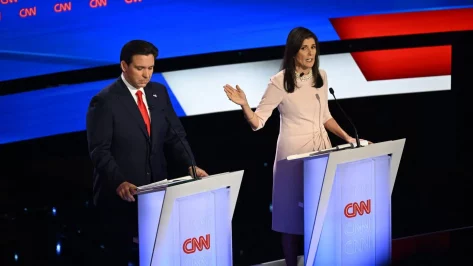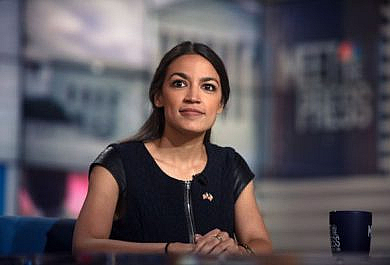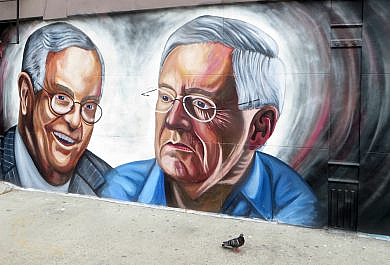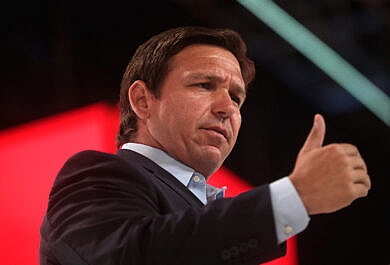Former UN Ambassador Nikki Haley and Florida Gov. Ron DeSantis faced off in a spirited and at-times nasty debate on Wednesday night, days before Monday’s Iowa Caucuses kick off the Republican presidential nominating process.
Summary
Former UN Ambassador Nikki Haley and Florida Gov. Ron DeSantis faced off in a spirited and at-times nasty debate on Wednesday night, days before Monday’s Iowa Caucuses kick off the Republican presidential nominating process.
- DeSantis and Haley wasted little time going after each other on their records and how they’ve conducted their campaigns. DeSantis derided Haley as a “mealy-mouth politician” while Haley mocked DeSantis for blowing $150 million on his campaign (and for spending exorbitant amounts on private jets) only to lose support in the polls.
- For example, DeSantis knocked Haley for not passing school choice as governor, while Haley responded that she passed E-Verify, the system to check that employees are legal workers in the US, in her first year as governor while DeSantis waited five years and only acted when he decided to run for president.
- Haley accused DeSantis of lying about her record and repeatedly directed viewers to “DeSantisLies.com.” DeSantis hit her for using “warmed-over” talking points, but then repeatedly claimed this was “not a time for pale pastels,” which itself is a nearly half-century-old GOP talking point.
- The two candidates are competing for the second-place spot behind former President Donald Trump, who holds a double-digit lead over them both in Iowa.
- The race is much closer in New Hampshire, where Haley has polled within single digits of Trump while DeSantis lags behind.
- Both Haley and DeSantis went after Trump for once again skipping the debate, which was moderated by CNN’s Jake Tapper and Dana Bash, dodging another opportunity for his rivals to hold him accountable for his record as President.
- When they weren’t attacking each other, both candidates sharply criticized Trump for blowing up the national debt, for failing to build a wall, for how he handled Jan. 6, for locking down the country on Anthony Fauci’s advice, and for being too weak towards China.
![]()
- The Washington Post’s takeaways from the debate included the candidates’ decision to criticize Trump on policy, even when asked directly about his character; that both drew contrasts with Trump on respect for the Constitution and upholding the rule of law; and that both took hawkish positions on immigration as the issue rises in importance amid the ongoing migrant crisis.
- NBC News covered Trump’s debate-dodging counterprogramming on Fox News, where he sat down for a town hall hosted by Bret Baier and Martha McCallum. Trump hinted that he has already decided who his running mate will be despite not having actually won the primary yet.
- The New York Times assessed the impact ex-New Jersey Gov. Chris Christie’s withdrawal will have on the GOP primary. Haley appears poised to vacuum up Christie’s support in New Hampshire, giving her campaign “a huge shot of adrenaline” just days ahead of the first nominating contests.
![]()
- The New York Post surveyed a panel of five “veteran politics watchers” for their views on the fifth GOP debate, and four of those five thought Haley emerged as the victor. Haley was “sharp, informed, and compelling,” GOP strategist Bill O’Riley told the post, while DeSantis “lacks the confidence that Haley exudes.”
- The Commentary Magazine asked, “Why didn’t they just not run?” The hosts debate why Christie thought he could succeed even a decade after the Bridgegate scandal, why DeSantis decided to run without criticizing Trump, and whether Haley’s rapid-fire delivery would’ve left her better placed for a career as a tobacco auctioneer than a presidential candidate.
- National Review’s Noah Rothman argued that despite the debate’s “overcaffeinated” vibe, the two candidate were able to stake out “meaningful distinctions” between their worldviews in foreign policy, immigration policy and the role of government.
© Dominic Moore, 2023






